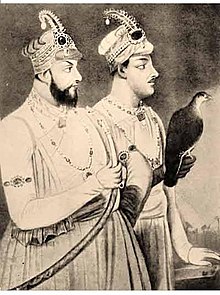
Back فوجدار Arabic ফৌজদার Bengali/Bangla Fawdjdar Catalan Faujdar German Faujdar Spanish Faudzsdár Hungarian Faujdar Italian ファウジュダール Japanese Faujdar Portuguese பௌஜ்தார் Tamil
This article needs additional citations for verification. (December 2009) |

Faujdar under the Mughals was an office that combined the functions of a military commander along with judicial and land revenue functions.[1] The term faujdar contained pre-Mughal origins. During those times, the term referred to a military officer but did not refer to a specific rank. With the administrative reforms of Mughal emperor Akbar, this rank was systemised. It constituted an independent administrative unit and its territorial limits varied from place to place and from time to time.[2]
A faujadari comprised a number of thanas or military outposts. At each of these the number of swears were stationed under a thanadar. Faujdari carried with it a fixed number of sawars and it was up to the faujdar to station soldiers in various thanas under him.[3]
In addition in some faujdaris there were a number of thanas described as huzuri or huzuri mashruti. In these thanas the Thanadars were appointed directly by the central government via royal orders or at the recommendations of the Nizam or Diwan of the province. Such thanadars were to a considerable degree independent officers who could receive orders direct from the central government. They were probably placed under the overall supervision of the faijdar and were expected to cooperate with him in mainataing law and order. They were created to ensure an efficient check on ambitious faujdars.[4]
In any case in an emergency the faujdar of a charge could be called upon to enforce imperial regulations.[5]
They were appointed by virtue of a royal order and the appointment bore the seal of the Bakshi ul Mulki. They received orders directly from the Emperor and submitted petitions directly to the court. Transfer was a well established practice.[6]
- ^ Alam & Subrahmanyam 1998, p. 251.
- ^ Alam & Subrahmanyam 1998, p. 236.
- ^ Alam & Subrahmanyam 1998, p. 243.
- ^ Alam & Subrahmanyam 1998, pp. 243–244.
- ^ Alam & Subrahmanyam 1998, p. 244.
- ^ Alam & Subrahmanyam 1998, p. 245.